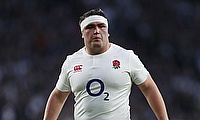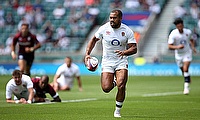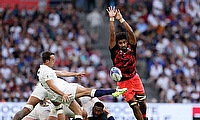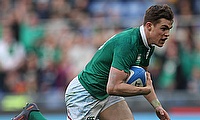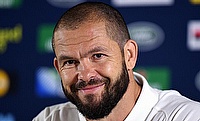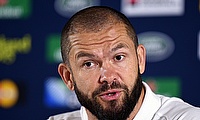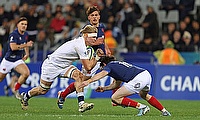How Champions Cup rugby has affected England selection
England’s meteoric return to atop – or thereabouts – the global rugby pile under Eddie Jones has admittedly not coincided with any seismic change in personnel since the previous reign of Stuart Lancaster.
The England of the last 15 months who have dispatched 16 consecutive teams in the international arena have not been buoyed by the rise of a team renewed with a gluttony of global megastars, instead the difference has originated from behind the scenes with Jones, Borthwick, Gustard et al. implementing a new gameplan designed to optimise the talents of the player pool at their disposal.
But how representative is the current England Elite Squad of the English Premiership? Is there a distinct chasm opening between the ‘haves’ and ‘have nots’ within the league epitomised by the current composition of the highest level of English rugby? And is England selection increasingly based upon where you’re playing your club rugby?
To answer these questions we must first analyse how the latest 34-man iteration of the England international team, selected to compete in this year’s Six Nations tournament, breaks down:
Forwards
Nathan Catt (Bath Rugby)
Jack Clifford (Harlequins)
Dan Cole (Leicester Tigers)
Charlie Ewels (Bath Rugby)
Ellis Genge (Leicester Tigers)
Jamie George (Saracens)
Teimana Harrison (Northampton Saints)
Dylan Hartley (Northampton Saints)
James Haskell (Wasps)
Nathan Hughes (Wasps)
Maro Itoje (Saracens)
George Kruis (Saracens)
Joe Launchbury (Wasps)
Courtney Lawes (Northampton Saints)
Joe Marler (Harlequins)
Matt Mullan (Wasps)
Kyle Sinckler (Harlequins)
Tommy Taylor (Wasps)
Mike Williams (Leicester Tigers)
Tom Wood (Northampton Saints)
Backs
Mike Brown (Harlequins)
Danny Care (Harlequins)
Elliot Daly (Wasps)
Owen Farrell (Saracens)
George Ford (Bath Rugby)
Jonathan Joseph (Bath Rugby)
Alex Lozowski (Saracens)
Jonny May (Gloucester Rugby)
Jack Nowell (Exeter Chiefs)
Henry Slade (Exeter Chiefs)
Ben Te’o (Worcester Warriors)
Anthony Watson (Bath Rugby)
Marland Yarde (Harlequins)
Ben Youngs (Leicester Tigers)
On a club-by-club breakdown the squad works out thusly (current league position):
Wasps (1st)– 6
Harlequins (6th) – 6
Saracens (2nd) – 5
Bath (4th) – 5
Leicester (5th) – 4
Northampton (8th) – 4
Exeter (3rd) - 2
Newcastle (7th) – 0
Gloucester (9th) – 1
Sale Sharks (10th) – 0
Worcester (11th) – 1
Bristol (12th) - 0
Wasps’ rich vein of form in the season’s first half and Harlequins’ long-standing academy infrastructure and youth policy (rather than their current league position) sees both teams atop the pile with six representatives respectively.
Saracens and Bath meanwhile, a veritable one-two punch atop the table over the last few seasons also rank strongly with five players from each team selected by Jones’ braintrust.
Northampton, this season performing slightly below their historic average in 8th, still retain four, the same number as Midland rivals Leicester.
Beyond the historically strongest six teams however, representation dries up considerably.
Despite Exeter’s current third-placed standing and losing finalists berth from last season, only Jack Nowell and Henry Slade have been rewarded with capped honours for their country. From there the picture is even starker; Gloucester and Worcester both have one representative each weekend at Twickenham (Jonny May and Ben Teo’o respectively) whilst Newcastle, Bristol and Sale Sharks have a grand total of zero between them.
So what exactly does this tell us?
Perhaps unsurprisingly, it would appear international reputation often precedes domestic form in selecting the England national team.
Despite Harlequins’ and Northampton’s relative underachievement in the last eighteen months, both teams retain a strong presence on the international stage due to the longevity of their international mainstays – Dylan Hartley, Tom Wood, Courtney Lawes, Joe Marler, Mike Brown and Marland Yarde.
Furthermore it would appear there is potentially a link between playing for hithero ‘unfashionable’ clubs and being selected for England honours. Neither of the Premiership’s teams based in the northern half of the country contain a representative of the national side despite Sale’s sixth place finish in 2015-16 and Newcastle Falcons’ outstanding form this season (they currently sit 7th in the table).
In addition, of the team’s currently in the bottom-four (Gloucester, Sale, Worcester and Bristol) only May (a holdover from the Lancaster era) and Teo’o (a league convert given priority access to the England team in order to secure his international allegiance) are members of Jones’ Six Nations squad.
It would be folly to not recognise that teams logically perform better domestically when they have access to international-standard players, hence Saracens and Wasps’ healthy contingents. But it would appear that under Jones at least, England have typically looked to pick a mix of players from teams in and around the top-six and those already with substantial international experience.
The results under Jones speak for themselves, of course, but the inclusion of Ellis Genge (who joined Leicester from Bristol last season), Mike Williams (Leicester from Worcester) and Tommy Taylor (Wasps from Sale) in this year’s squad is perhaps indicative that aspiring England players, at least currently, are rewarded from playing in larger, wealthier and indeed better squads and from the increased exposure that invariably results from this – particularly participation in the absolute top level of domestic rugby – the European Champions Cup.
Not only does Champions Cup rugby receive great publicity than its little-sister Challenge Cup counterpart, conventional logic dictates that players consistently playing in the former are battle-hardened against a significantly better standard of players and develop to an more significant degree as a result. In short, outside of genuine test internationals, the Champions Cup provides the best possible standard of rugby for players to impress the natonal team’s coaching staff and put their hand up for selection. It takes a rare type of player then, for example a unique case of a supremely talented and English-eligible league convert in Teo’o (and soon potentially Denny Solomona) or an experienced head at a weak international position in May, to break into the top-level of international rugby without annual examination at the highest level of domestic rugby.
This is both a logical and reasonable conclusion to make. In truth, the selection process for England rugby is a complex amalgam of current domestic form, previous international experience, positional depth, long-term potential for consistency within the international setup, project player status and indeed reputation.
As an extension, it also takes a rare specimen, for example Maro Itoje, to be immediately fast-tracked from age-grade rugby into the full senior team without at least a season’s worth of exemplary performances in the Premiership under their belt. Whilst a substantial proportion of England’s previous U20 squads have eventually made it into the senior side, outstanding participation at the oldest age-grade level alone is not an absolute guarantee of future England honours.
To summarise, there is no reason to believe that there is conspiratorial anti-Northern or ‘unfashionable club’ bias impacting England selection – even if the representation figures suggest there is a possible correlation. Instead, we can conclude there is significantly more scope for England selection for players who are either exposed to the highest level of domestic rugby in the European Champions Cup or whom have accumulated a significant amount of international experience previously. The recent inclusion of Ellis Genge, Tommy Taylor and Mike Williams in England’s Six Nations Squad is perhaps a re-affirmation of the necessity of Champions Cup rugby for inclusion in the England national team.

